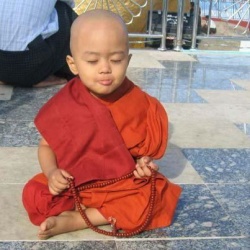Generosity in Buddhism By Jacqueline Kramer
The Hearth Foundation
Twenty-five hundred years ago the Buddha lived and taught in the area now known as Nepal and India. At that time there lived a wealthy man by the name of Anathapindika. Anathapindika was a follower of the Buddha. To support the Buddha, and in gratitude for the Buddha’s teachings, Anathapindika purchased a magnificent park and built facilities in which the Buddha and his community of monks could live and teach.
It was in this beautiful park that the Buddha delivered several talks for the lay community. Two of these talks were on generosity. In the discourse on generosity, the Buddha advised that the first stage of the Buddhist spiritual path is to practice generosity.
Many westerners believe that the practice of meditation is the basis of Buddhist practice. But Buddhism is much richer and more multilayered than that. Generosity was the first practice the Buddha taught to lay people when he traveled throughout India. If spiritual practitioners are well grounded in generosity, their hearts are more available for insight when they sit down to meditate.
Because Buddhists place great importance on generosity they have many words to describe it, just as the Eskimos have many words for snow. Two of these words are dana and caga. Dana translates as “distribution of gifts.” Caga translates as “a heart bent on giving.” Dana, or giving, is intimately tied to karma, or cause and effect. Caga describes the state of mind of the generous giver, or the desire to give. It is caga that creates a rich soil for our meditation.
There are three degrees of generosity spoken of in Buddhism. The first degree is miserly giving. This is when we give away that which we no longer want. It is considered miserly because giving in this way asks nothing of us. This sort of giving is like recycling, and it is valuable but not particularly generous. The next level of generosity is kindly giving. With kindly giving we give away what we would like to receive. There is a thoughtfulness and friendliness in this kind of giving. The third, and highest, form of giving is kingly giving. In kingly giving we give the very best of what we have in time, material goods, or, in some cases, even our lives.
Buddhism is mostly concerned with our state of mind. Ultimately, generosity in Buddhism is about nonattachment and loving kindness. When we develop generosity, our mind becomes lighter and more available to insight. The act of generous giving is a means to that end. It is through giving with a kind, loving heart that we develop our capacity to let go. As we let go we become freer, lighter, and happier.
The Buddha said, “If beings knew, as I know, the fruit of sharing gifts, they would not enjoy their use without sharing them, nor would the taint of stinginess obsess the heart and stay there. Even if it were their last bit, their last morsel of food, they would not enjoy its use without sharing it, if there were anyone to receive it.” (Itivuttaka 18)

